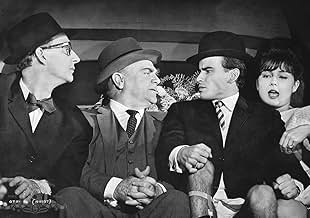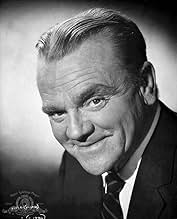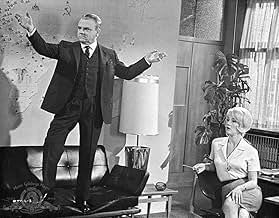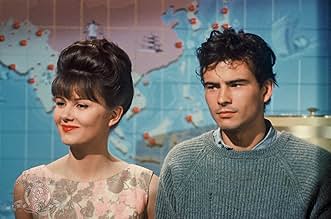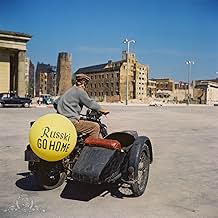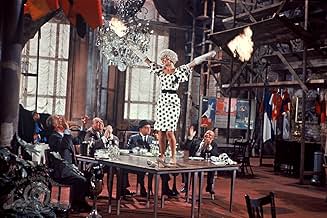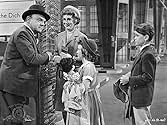ÉVALUATION IMDb
7,8/10
24 k
MA NOTE
À Berlin-Ouest pendant la guerre froide, un cadre de Coca-Cola est chargé de s'occuper de la fille de son patron.À Berlin-Ouest pendant la guerre froide, un cadre de Coca-Cola est chargé de s'occuper de la fille de son patron.À Berlin-Ouest pendant la guerre froide, un cadre de Coca-Cola est chargé de s'occuper de la fille de son patron.
- Director
- Writers
- Stars
- Nommé pour 1 oscar
- 1 victoire et 8 nominations au total
Liselotte Pulver
- Fräulein Ingeborg
- (as Lilo Pulver)
Loïs Bolton
- Melanie Hazeltine
- (as Lois Bolton)
John Banner
- Krause
- (voice)
- …
Christine Allen
- Cindy MacNamara
- (uncredited)
Avis en vedette
James Cagney was pretty much retired when Billy Wilder lured him away from his farm to do "One, Two, Three," a witty, fast-moving comedy from 1961. And what a credit to Cagney - rapid dialogue and plenty of it, taxing to memorize probably for a man half his age.
The story concerns an American Coca-Cola executive, C.R. McNamara, heading up an office in Berlin who is asked by his boss to host his daughter (Pamela Tiffin). Hoping for a plum assignment in London, C.R. and his wife (Arlene Francis) welcome the young woman with open arms. She's southern, beautiful, flirtatious, and before they know it, she's got a Communist boyfriend (Horst Bucholz) Then he becomes her Communist husband, and that London promotion is looking less and less likely unless C.R. can pull off a miracle.
Wilder's direction for this was to have the dialogue shouted rather than spoken and to keep the film moving at a very fast pace. Admittedly this can get a little exhausting. Cagney gives a high-voltage performance and is extremely funny as the harried executive. And there are some hysterical bits as well as the madcap feeling of a '30s film. The rest of the cast is wonderful: Arlene Francis as C.R.'s long-suffering wife, Lilo Pulver as C.R.'s sexy secretary, and Hanns Lothar as Schlemmer, C.R.'s assistant who was "underground" during the war. ("The resistance?" "No, the subway. Nobody told me anything down there.") Though this was not a happy set - Wilder and Cagney had their differences, and Horst Buccholz was a major pain - the result is very good. Late in their careers, Wilder and Cagney still had it. Big time.
The story concerns an American Coca-Cola executive, C.R. McNamara, heading up an office in Berlin who is asked by his boss to host his daughter (Pamela Tiffin). Hoping for a plum assignment in London, C.R. and his wife (Arlene Francis) welcome the young woman with open arms. She's southern, beautiful, flirtatious, and before they know it, she's got a Communist boyfriend (Horst Bucholz) Then he becomes her Communist husband, and that London promotion is looking less and less likely unless C.R. can pull off a miracle.
Wilder's direction for this was to have the dialogue shouted rather than spoken and to keep the film moving at a very fast pace. Admittedly this can get a little exhausting. Cagney gives a high-voltage performance and is extremely funny as the harried executive. And there are some hysterical bits as well as the madcap feeling of a '30s film. The rest of the cast is wonderful: Arlene Francis as C.R.'s long-suffering wife, Lilo Pulver as C.R.'s sexy secretary, and Hanns Lothar as Schlemmer, C.R.'s assistant who was "underground" during the war. ("The resistance?" "No, the subway. Nobody told me anything down there.") Though this was not a happy set - Wilder and Cagney had their differences, and Horst Buccholz was a major pain - the result is very good. Late in their careers, Wilder and Cagney still had it. Big time.
I first saw this film in a theater when it came out. Laughed so hard I fell out of my seat (and was spared considerable embarrassment only by the fact that everyone around me was doing the same thing). I can't count the number of times I've seen it over the years, but I know one thing for sure: I've yet to spot all the gags. (They come so fast upon each other's heels that you're likely to miss two for every one you're still laughing over.)
Wilder plays no favorites -- and he takes no prisoners -- here. Everything within his considerable reach (the Cold War, the postwar era, spy-exchanges, Communism, capitalism, European aristocrats, idealism and cynicism, JUST for starters) is lampooned equally. (Even at least one of Cagney's early performances, in "Public Enemy," takes a shot.)
Frankly, I'm surprised this film today has so many staunch fans who weren't around back when so much of its humor was "topical." Its ongoing appeal has to be attributed both to Wilder's pacing and to James Cagney's hallmark performance as McNamara (a poster child for high blood-pressure if ever there was one). Neither he nor Wilder ever let up, ably aided by a solid cast (Horst Bucholtz in particular, strangely enough!) who manage somehow always to catch up.
"One, Two, Three:" that's how fast the gags fly. See if you can keep up.
Wilder plays no favorites -- and he takes no prisoners -- here. Everything within his considerable reach (the Cold War, the postwar era, spy-exchanges, Communism, capitalism, European aristocrats, idealism and cynicism, JUST for starters) is lampooned equally. (Even at least one of Cagney's early performances, in "Public Enemy," takes a shot.)
Frankly, I'm surprised this film today has so many staunch fans who weren't around back when so much of its humor was "topical." Its ongoing appeal has to be attributed both to Wilder's pacing and to James Cagney's hallmark performance as McNamara (a poster child for high blood-pressure if ever there was one). Neither he nor Wilder ever let up, ably aided by a solid cast (Horst Bucholtz in particular, strangely enough!) who manage somehow always to catch up.
"One, Two, Three:" that's how fast the gags fly. See if you can keep up.
Howard Hawks usually gets the palm for the fastest dialogue in comedies but Wilder probably ties him here. This must be one of the funniest comedies to come out of Hollywood, at least during the sound era. The gags come fast -- and thick. If one doesn't work you don't have time to be disappointed because the next one is already underway.
It's one of those movies in which the gags would be spoiled if they were described to a person who hadn't yet seen the film. For the most part they are tied closely to the plot and often build on one another. But I'm compelled to give one example. Cagney is an executive in Berlin and his first-hand man is Schlemmer. Schlemmer has a habit of clicking his heels before and after addressing Cagney. At one point Cagney chews him out and asks him, "just between us," what Schlemmer did in the war. "I was in the underground," says Schlemmer. "Oh, the resistance?" "No, the underground. The subway. I was a conductor." Cagney says supiciously, "And I suppose you never were a supporter of Adolf." Schlemmer: "Adolf who? You see, I was always in the underground. They never told us anything down there."
The dialogue is shouted rather than spoken. Heels are clicked, people leap to attention, fingers are snapped, orders are flung about. The only person who doesn't run around frantically is Lilo Pulver who does not have to run to attract anyone's attention. She can simply stand still and get the job done. She's Cagney's secretary and tells him she's thinking of getting a job elsewhere as a translator. "Don't forget I am bilingual." "Don't I know it," Cagney mutters ruefully.
But I won't go on because I'll just wind up giving away more gags. Check the trivia entries too. This was Cagney's last major role and one of Wilder's best comedies. It's simply hilarious and not to be missed.
It's one of those movies in which the gags would be spoiled if they were described to a person who hadn't yet seen the film. For the most part they are tied closely to the plot and often build on one another. But I'm compelled to give one example. Cagney is an executive in Berlin and his first-hand man is Schlemmer. Schlemmer has a habit of clicking his heels before and after addressing Cagney. At one point Cagney chews him out and asks him, "just between us," what Schlemmer did in the war. "I was in the underground," says Schlemmer. "Oh, the resistance?" "No, the underground. The subway. I was a conductor." Cagney says supiciously, "And I suppose you never were a supporter of Adolf." Schlemmer: "Adolf who? You see, I was always in the underground. They never told us anything down there."
The dialogue is shouted rather than spoken. Heels are clicked, people leap to attention, fingers are snapped, orders are flung about. The only person who doesn't run around frantically is Lilo Pulver who does not have to run to attract anyone's attention. She can simply stand still and get the job done. She's Cagney's secretary and tells him she's thinking of getting a job elsewhere as a translator. "Don't forget I am bilingual." "Don't I know it," Cagney mutters ruefully.
But I won't go on because I'll just wind up giving away more gags. Check the trivia entries too. This was Cagney's last major role and one of Wilder's best comedies. It's simply hilarious and not to be missed.
In 1959, Billy Wilder painted the Mona Lisa of screwball comedy with "Some Like it Hot". He outdid himself again in 1960 with "The Apartment", a witty romantic comedy and sharp satire against office mentalities and lust-driven careerism, the film took home the Best Picture Oscar. If all good things went in three, the appropriately titled "One, Two, Three", third comedy in a consecutive year, from the Wilder-Diamond partnership should have been a masterpiece. In fact, it has the more modestly-designed set of a little dessert, after two copious meals.
But for a dessert, it's still 'rich' enough to be enjoyed with its machine-gun dialogues worthy of Hawks and Cukor' classics that makes you wonder if you didn't accidentally fast-forward the film at 1.5 speed. And there is such vaudevillian streak of incongruous events and improbable coincidence that it provides the right canvas for safe hilarity, in other words so many things happen in the film that even the lousiest gag doesn't have time to fall flat, another comes at the rescue. And as Coca-Cola executive McNamara, James Cagney delivers a painstakingly energetic performance that exhausted him so much he retired from acting for 20 years until his cameo in "Ragtime", that's how demanding his role was... and you can feel it in the screen.
Cagney didn't get along with Horst Bucholz who plays Otto the young idealist communist who marries the Coca Cola's top man's daughter (Pamela Tiffin) and wished he could kick his ass to calm down his scene-stealing impulses. These incidences reminded me of Fonda not getting along with Ford during the shooting of "Mister Roberts", starring Cagney as well, but that didn't affect the film since it's all meant to be a big joke and in the scenery-chewing contest, Cagney and Bucholz are equally hammy and funny if you look at the film with indulgent eyes. Maybe Cagney was too old and Jack Lemmon would have been a more fitting choice as a middle-aged executive in one of the most emblematic American brands. We'll never know.
The real problem in "One, Two, Three" is that it starts brilliantly, the whole first act where we see "Mac" handling Germans' manners and double-edged efficiency draws a pattern of cultural clashes' gags that found an echo in both the Cold War context and the difference of mentalities between America and the European world, as if there was a second curtain behind the infamous iron one (though much lighter). But even if if the non-existence of the Berlin wall (only mentioned at the beginning) dates the film, made ironically the exact year of its building, the film also managed to be ahead of its time prophesizing the missiles crisis with a Russian executive saying about Cuban, "they give us cigars, we give them missiles".
The dialogues with the Soviet representatives are nothing short of brilliant writing, reminding us of the wit that Wilder displayed when he wrote "Ninothcka", a film whose comedic efficiency also depend on a funny Soviet trio. The comment about the Swiss cheese being rejected because it had holes had me in tears, to name that one. The plot thickens to the point of convolution when it adds the romantic subplot but it makes up for the blandness of the two lovers (no matter how colorful they're made to be) when it adds another dimension of cultural shift between Southerners and Yankees, the flimsy Southern belle didn't realize the political meaning of "Yankee, go home" slogan nor what a house "with a short walk to the bathroom" implied.
But the best asset the film has to offer is its slice of life from both sides of the Iron curtain or the soon-to-be Berlin wall. For all the antagonism directed against US capitalism, there might be one thing no one can resist which is a bottle of Coca-Cola, the brand that perhaps sold the American dream more than any political operation. So watching Cagney playing diplomacy with the Russian provided the film's best moments culminating with that unforgettable Sabre Dance and barefeet Fraulein Ingebörg frenetically shaking her voluptuous body on a restaurant table in front of executives getting an exciting taste of the Western dream. That musical sequence might be one of my favorite from any Wilder films and it's crucially set at mid-point just when the plot started to drag.
As I said, Horst Bucholz was hammy only to the degree that it was the only possible way to go the distance with Cagney and I enjoyed watching the lovable Arlene Francis playing his resigned but not discouraged wife. Yet the film is so busy providing one liners right after another that it takes the safe side and injects lousy wedding-and-divorce segments where so much could have been done in the area of politics. But maybe Wilder was getting too old-fashioned leaving sharper tones to a certain Cold-War comedy directed by Stanley Kubrick, interestingly a movie that also pays a tribute to Coca Cola through one of its most memorable scenes. That level of wit is missing in the film already dated by its own context. One thing to its defense though, it offers the perfect response to Joan Crawford's complain of product placement and the perfect punchline with Pepsi Cola having the last word.
And to give a last word, if the film isn't in the same league that "Some Like it Hot" and "The Apartment" and marks the decline of Wilder's prestige and awards pretensions, it still works and maybe it does so because somewhere I could feel it didn't pretend to be anything but a farce and comedy of manners with the Cold War as the backdrop. A "Dr. Strangelove" it isn't but either you don't find it funny or you do. I did find it funny many times and brilliant in a few scenes.
But for a dessert, it's still 'rich' enough to be enjoyed with its machine-gun dialogues worthy of Hawks and Cukor' classics that makes you wonder if you didn't accidentally fast-forward the film at 1.5 speed. And there is such vaudevillian streak of incongruous events and improbable coincidence that it provides the right canvas for safe hilarity, in other words so many things happen in the film that even the lousiest gag doesn't have time to fall flat, another comes at the rescue. And as Coca-Cola executive McNamara, James Cagney delivers a painstakingly energetic performance that exhausted him so much he retired from acting for 20 years until his cameo in "Ragtime", that's how demanding his role was... and you can feel it in the screen.
Cagney didn't get along with Horst Bucholz who plays Otto the young idealist communist who marries the Coca Cola's top man's daughter (Pamela Tiffin) and wished he could kick his ass to calm down his scene-stealing impulses. These incidences reminded me of Fonda not getting along with Ford during the shooting of "Mister Roberts", starring Cagney as well, but that didn't affect the film since it's all meant to be a big joke and in the scenery-chewing contest, Cagney and Bucholz are equally hammy and funny if you look at the film with indulgent eyes. Maybe Cagney was too old and Jack Lemmon would have been a more fitting choice as a middle-aged executive in one of the most emblematic American brands. We'll never know.
The real problem in "One, Two, Three" is that it starts brilliantly, the whole first act where we see "Mac" handling Germans' manners and double-edged efficiency draws a pattern of cultural clashes' gags that found an echo in both the Cold War context and the difference of mentalities between America and the European world, as if there was a second curtain behind the infamous iron one (though much lighter). But even if if the non-existence of the Berlin wall (only mentioned at the beginning) dates the film, made ironically the exact year of its building, the film also managed to be ahead of its time prophesizing the missiles crisis with a Russian executive saying about Cuban, "they give us cigars, we give them missiles".
The dialogues with the Soviet representatives are nothing short of brilliant writing, reminding us of the wit that Wilder displayed when he wrote "Ninothcka", a film whose comedic efficiency also depend on a funny Soviet trio. The comment about the Swiss cheese being rejected because it had holes had me in tears, to name that one. The plot thickens to the point of convolution when it adds the romantic subplot but it makes up for the blandness of the two lovers (no matter how colorful they're made to be) when it adds another dimension of cultural shift between Southerners and Yankees, the flimsy Southern belle didn't realize the political meaning of "Yankee, go home" slogan nor what a house "with a short walk to the bathroom" implied.
But the best asset the film has to offer is its slice of life from both sides of the Iron curtain or the soon-to-be Berlin wall. For all the antagonism directed against US capitalism, there might be one thing no one can resist which is a bottle of Coca-Cola, the brand that perhaps sold the American dream more than any political operation. So watching Cagney playing diplomacy with the Russian provided the film's best moments culminating with that unforgettable Sabre Dance and barefeet Fraulein Ingebörg frenetically shaking her voluptuous body on a restaurant table in front of executives getting an exciting taste of the Western dream. That musical sequence might be one of my favorite from any Wilder films and it's crucially set at mid-point just when the plot started to drag.
As I said, Horst Bucholz was hammy only to the degree that it was the only possible way to go the distance with Cagney and I enjoyed watching the lovable Arlene Francis playing his resigned but not discouraged wife. Yet the film is so busy providing one liners right after another that it takes the safe side and injects lousy wedding-and-divorce segments where so much could have been done in the area of politics. But maybe Wilder was getting too old-fashioned leaving sharper tones to a certain Cold-War comedy directed by Stanley Kubrick, interestingly a movie that also pays a tribute to Coca Cola through one of its most memorable scenes. That level of wit is missing in the film already dated by its own context. One thing to its defense though, it offers the perfect response to Joan Crawford's complain of product placement and the perfect punchline with Pepsi Cola having the last word.
And to give a last word, if the film isn't in the same league that "Some Like it Hot" and "The Apartment" and marks the decline of Wilder's prestige and awards pretensions, it still works and maybe it does so because somewhere I could feel it didn't pretend to be anything but a farce and comedy of manners with the Cold War as the backdrop. A "Dr. Strangelove" it isn't but either you don't find it funny or you do. I did find it funny many times and brilliant in a few scenes.
"One, Two, Three" is a marvelously, funny film. It has an energy that you can't help but get caught up in.
From the time you hear the first few bars of "The Sabre Dance" thru the final shot of James Cagney, you are on a constant roller coaster, and you don't want to get off. It is a manic, wild movie that never disappoints or lets down.
The engine that drives this lunacy is James Cagney. In one of his best, funniest and energetic performances, he is nothing short of amazing. He is a whirling dervish, at the heart of a storm that he has no control over. I don't want to give any of the story away, suffice to say that he is nothing short of spectacular. In Cameron Crowe's book on Billy Wilder, Wilder laments that Cagney was so loud and energetic at the start of the film, that his character really has nowhere to go, in terms of building, and reacting to the chaos. I would agree with that assessment, but Cagney's performance does not let the audience stop and catch it's breath long enough for this to really be a factor.
Wilder and Diamond have brought us another gem. Is there another writing team that within a span of three years, have created three better pictures than the ones they have given us (Some Like It Hot, The Apartment, One,Two,Three)? I doubt it.
Kudos all around to the supporting cast as well. Especially, Arlene Francis, as Cagney's wife, and Lilo Pulver as his secretary. Also watch for some "inside" jokes. Like when Cagney threatens Horst Buchholz with a grapefruit, and Red Buttons, in a cameo, doing a Cagney imitation.
Great fun from start to finish. 10/10
From the time you hear the first few bars of "The Sabre Dance" thru the final shot of James Cagney, you are on a constant roller coaster, and you don't want to get off. It is a manic, wild movie that never disappoints or lets down.
The engine that drives this lunacy is James Cagney. In one of his best, funniest and energetic performances, he is nothing short of amazing. He is a whirling dervish, at the heart of a storm that he has no control over. I don't want to give any of the story away, suffice to say that he is nothing short of spectacular. In Cameron Crowe's book on Billy Wilder, Wilder laments that Cagney was so loud and energetic at the start of the film, that his character really has nowhere to go, in terms of building, and reacting to the chaos. I would agree with that assessment, but Cagney's performance does not let the audience stop and catch it's breath long enough for this to really be a factor.
Wilder and Diamond have brought us another gem. Is there another writing team that within a span of three years, have created three better pictures than the ones they have given us (Some Like It Hot, The Apartment, One,Two,Three)? I doubt it.
Kudos all around to the supporting cast as well. Especially, Arlene Francis, as Cagney's wife, and Lilo Pulver as his secretary. Also watch for some "inside" jokes. Like when Cagney threatens Horst Buchholz with a grapefruit, and Red Buttons, in a cameo, doing a Cagney imitation.
Great fun from start to finish. 10/10
Le saviez-vous
- AnecdotesThe film recorded a loss of $1.6 million. It didn't do well at either the U.S. or German box office because the story felt much more sinister in 1961 when the Berlin Wall was erected.
- GaffesSchlemmer calls his former superior officer in the SS "Herr Oberleutnant". The SS had no rank of Oberleutnant nor did its members call each other Herr. Oberleutnant was a German Army rank. The corresponding SS rank was Obersturmführer. In the German (dubbed) version, Schlemmer correctly addresses him as "Obersturmführer".
- Citations
Borodenko: When will papers be ready?
C.R. Macnamara: I'll put my secretary right to work on it.
Mishkin: Your secretary? She's that blonde lady?
C.R. Macnamara: That's the one.
Peripetchikoff: [after conferring with the others] You will send papers to East Berlin with blonde lady in triplicate.
C.R. Macnamara: You want the papers in triplicate, or the blonde in triplicate?
Peripetchikoff: See what you can do.
- ConnexionsEdited into Grand format: Amérique, notre histoire (2006)
Meilleurs choix
Connectez-vous pour évaluer et surveiller les recommandations personnalisées
Détails
Box-office
- Budget
- 3 000 000 $ US (estimation)
- Brut – à l'échelle mondiale
- 146 $ US
- Durée1 heure 44 minutes
- Couleur
- Rapport de forme
- 2.35 : 1
Contribuer à cette page
Suggérer une modification ou ajouter du contenu manquant


